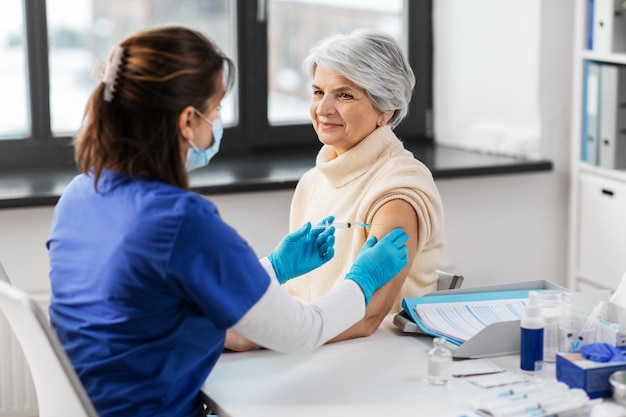Boost Immunity: 2025 Vaccination Schedule for Adults Over 60

The updated vaccination schedule for adults over 60 in 2025 focuses on boosting immunity against prevalent and potentially severe diseases like influenza, pneumonia, shingles, and Tdap, with personalized recommendations based on individual health profiles.
As we age, our immune systems naturally weaken, making us more susceptible to illnesses. Staying proactive about health becomes increasingly important, and a key strategy for adults over 60 is to boost your immunity: the updated vaccination schedule for adults over 60 in 2025 is designed to provide optimal protection.
Understanding the Importance of Vaccinations for Seniors
Vaccinations are a cornerstone of preventive healthcare, especially for older adults. As we age, our immune systems become less efficient at fighting off infections, a phenomenon known as immunosenescence. This makes seniors more vulnerable to severe complications from diseases that might be mild in younger individuals.
Vaccinations work by exposing the body to a weakened or inactive form of a pathogen (like a virus or bacteria). This triggers the immune system to produce antibodies, which are specialized proteins that recognize and neutralize the pathogen if it’s encountered again in the future. By getting vaccinated, seniors can significantly reduce their risk of contracting and suffering from serious diseases.

The Impact of Immunosenescence
Immunosenescence, the gradual decline of the immune system with age, affects both the innate and adaptive immune responses. This means that older adults may not respond as effectively to new infections or vaccines as younger adults. Understanding this process is crucial for tailoring vaccination strategies to maximize their effectiveness in seniors.
- Reduced T cell function: T cells play a crucial role in fighting off infections. Their function declines with age, making it harder for the body to clear pathogens.
- Decreased antibody production: Older adults may produce fewer antibodies in response to a vaccine, which can reduce the level and duration of protection.
- Increased inflammation: Chronic low-grade inflammation, known as “inflammaging,” can further impair immune function and increase the risk of age-related diseases.
Given these age-related changes, it’s essential for seniors to stay up-to-date on their vaccinations and to discuss their individual risk factors and health conditions with their healthcare provider.
In conclusion, vaccinations are a vital tool for protecting seniors from serious diseases and maintaining their overall health and well-being, especially when tailored to address the challenges posed by immunosenescence.
Key Vaccines Recommended for Adults Over 60 in 2025
The vaccination schedule for adults over 60 is designed to protect against diseases that pose a significant risk to this age group. Staying informed about the recommended vaccines and their benefits is essential for making informed decisions about your health.
Here’s an overview of the key vaccines recommended for adults over 60 in 2025:
Influenza Vaccine
The flu vaccine is recommended annually for everyone over 6 months of age, but it’s particularly important for seniors who are at higher risk of serious complications from the flu. The flu can lead to pneumonia, bronchitis, hospitalization, and even death in older adults.
The annual flu vaccine is updated each year to protect against the strains of influenza viruses that are expected to be most common during the upcoming flu season. There are several types of flu vaccines available, including standard-dose, high-dose, and adjuvanted vaccines specifically designed for older adults to boost their immune response.

Pneumococcal Vaccines
Pneumococcal disease is caused by bacteria that can lead to pneumonia, bloodstream infections, and meningitis. There are two types of pneumococcal vaccines recommended for older adults: PCV20 (Prevnar 20) and PPSV23 (Pneumovax 23).
- PCV20: This vaccine protects against 20 strains of pneumococcal bacteria and can be given as a single dose.
- PPSV23: This vaccine protects against 23 strains of pneumococcal bacteria and is typically given after PCV20 for broader coverage.
The Centers for Disease Control and Prevention (CDC) recommends that all adults 65 years or older receive one dose of PCV20 or a dose of PCV15 followed by a dose of PPSV23. Consult with your healthcare provider to determine the best pneumococcal vaccination schedule for you.
Staying up-to-date with influenza and pneumococcal vaccines is crucial for protecting seniors from respiratory illnesses and their potentially serious complications.
Shingles Vaccine: Protecting Against Herpes Zoster
Shingles, also known as herpes zoster, is a painful rash caused by the reactivation of the varicella-zoster virus, the same virus that causes chickenpox. After you’ve had chickenpox, the virus remains dormant in your body and can reactivate later in life, causing shingles.
The risk of developing shingles increases with age, and the pain associated with shingles can be severe and long-lasting, sometimes leading to a condition called postherpetic neuralgia (PHN). Fortunately, there is a highly effective vaccine available to prevent shingles.
Shingrix: The Preferred Shingles Vaccine
Shingrix is a recombinant subunit vaccine that is recommended for adults 50 years and older, regardless of whether they’ve had shingles before. It is given in two doses, spaced 2 to 6 months apart.
Shingrix has been shown to be over 90% effective in preventing shingles and PHN in adults 50 years and older. It is a significant improvement over the previous shingles vaccine, Zostavax, which was less effective and had waning immunity over time.
- High efficacy: Shingrix provides strong protection against shingles and its complications.
- Long-lasting immunity: Studies have shown that Shingrix provides protection for at least 7 years after vaccination.
- Recommended for those who previously received Zostavax: Even if you’ve had the Zostavax vaccine, Shingrix is still recommended for better protection.
If you are over 50, talk to your healthcare provider about getting the Shingrix vaccine to protect yourself from shingles and its debilitating effects.
In short, the Shingrix vaccine is a powerful tool for preventing shingles and improving the quality of life for older adults.
Tdap and Td Boosters: Maintaining Protection Against Tetanus, Diphtheria, and Pertussis
Tetanus, diphtheria, and pertussis (whooping cough) are serious bacterial infections that can be prevented with the Tdap and Td vaccines. While many people receive these vaccines as children, immunity wanes over time, making booster doses necessary for adults.
The Tdap vaccine protects against all three diseases, while the Td vaccine protects against tetanus and diphtheria. The CDC recommends that adults receive a Tdap booster once, followed by a Td booster every 10 years.
Who Should Receive Tdap?
The Tdap vaccine is particularly important for:
Pregnant women: To protect their newborns from pertussis, which can be life-threatening in infants.
- Healthcare professionals: Who are at increased risk of exposure to these diseases.
- Caregivers of infants: To prevent spreading pertussis to vulnerable babies.
The Td booster is recommended every 10 years to maintain protection against tetanus and diphtheria. It’s important to stay up-to-date on these boosters, especially if you have a wound or injury that increases your risk of tetanus.
Staying current with Tdap and Td boosters is essential for protecting yourself and those around you from these preventable diseases.
In conclusion, these vaccines are a crucial part of maintaining your overall health and well-being as you age.
Understanding Specific Vaccines for Over 60s based on Lifestyle and Medical History
While the core vaccinations like influenza, pneumococcal, shingles, and Tdap are generally recommended for all adults over 60, certain lifestyle factors and medical conditions may warrant additional vaccinations.
Your doctor can assess your individual risk factors and recommend a personalized vaccination schedule tailored to your specific needs.
Hepatitis B Vaccine
Adults with diabetes, those who live with someone who has Hepatitis B, or those who are at risk due to occupational exposure should consider getting this vaccine. Other risk factors can include IV drug use or having multiple sexual partners.
If you have any of these risk factors, talk to your doctor about getting vaccinated against hepatitis B. This vaccine series can offer lasting protection against a serious liver infection.
MMR Vaccine
The MMR vaccine is for measles, mumps, and rubella. If you didn’t receive it as a child, and are at risk for exposure, you should consider this vaccine later in life. Those who travel internationally should be especially wary.
- If you are unsure whether you received the MMR vaccine, talk to your doctor about getting vaccinated.
Vaccinations can be tailored to your specific needs and circumstances, providing targeted protection against diseases that pose a particular risk to you. Consult to make sure you get the care you need.
In summary, personalized vaccination strategies are essential for optimizing health outcomes for older adults.
Navigating the 2025 Vaccination Schedule: A Practical Guide
Navigating the vaccination schedule can seem overwhelming, but with a little planning and guidance, it can be a straightforward process. Here are some practical tips to help you stay on track with your vaccinations:
Consult your healthcare provider: The first step is to talk to your doctor about your individual vaccination needs. They can review your medical history, assess your risk factors, and recommend a personalized vaccination schedule.
Documenting Your Vaccinations
Tracking your vaccinations is essential for staying organized and ensuring you receive the right vaccines at the right time. Consider taking these steps:
- Keep a vaccination record: Ask your healthcare provider for a copy of your vaccination record and keep it in a safe place.
- Use a digital tool: Apps can send reminders when it’s time for boosters or other vaccines.
Staying informed and proactive about your vaccinations is key to protecting your health and well-being as you age. By following these practical tips, you can navigate the vaccination schedule with confidence and ensure you receive the protection you need.
In conclusion, taking a proactive approach to vaccination is one of the best investments you can make in your long-term health.
| Key Point | Brief Description |
|---|---|
| 💉Flu Vaccine | Annual protection against influenza strains. Crucial for seniors due to higher risk of complications. |
| 🛡️Pneumococcal Vaccines | Protects against pneumonia, bloodstream infections, and meningitis. PCV20 and PPSV23 are recommended. |
| 🩹Shingles Vaccine (Shingrix) | Highly effective in preventing shingles and postherpetic neuralgia. Two doses recommended for adults 50+. |
| 💪Tdap/Td Boosters | Maintains protection against tetanus, diphtheria, and pertussis. Tdap once, then Td every 10 years. |
Frequently Asked Questions (FAQ)
As we age, our immune systems weaken, making us more vulnerable to infections. Vaccines help boost immunity, reducing the risk of severe illness, hospitalization, and complications from preventable diseases like influenza and pneumonia.
Shingrix is a highly effective vaccine that protects against shingles, a painful condition caused by the reactivation of the chickenpox virus. It’s recommended for adults over 50 because it significantly reduces the risk of shingles and postherpetic neuralgia.
A flu shot is recommended annually for everyone over 6 months of age, especially for adults over 60. The flu virus changes each year, so a new vaccine is needed to protect against the latest strains and maximize protection.
Pneumococcal vaccines protect against pneumonia, bloodstream infections, and meningitis. The CDC recommends either PCV20 or a dose of PCV15 followed by PPSV23 for comprehensive protection against pneumococcal diseases in adults over 65.
Tdap protects against tetanus, diphtheria, and pertussis. Adults should receive a Tdap booster once, followed by a Td booster every 10 years to maintain protection against these preventable diseases. Consult with your doctor!
Conclusion
Staying informed about the updated vaccination schedule for adults over 60 in 2025 is a proactive step toward safeguarding your health. By consulting with your healthcare provider and adhering to the recommended vaccine guidelines, you can significantly reduce your risk of preventable diseases and enjoy a healthier, more active life.
